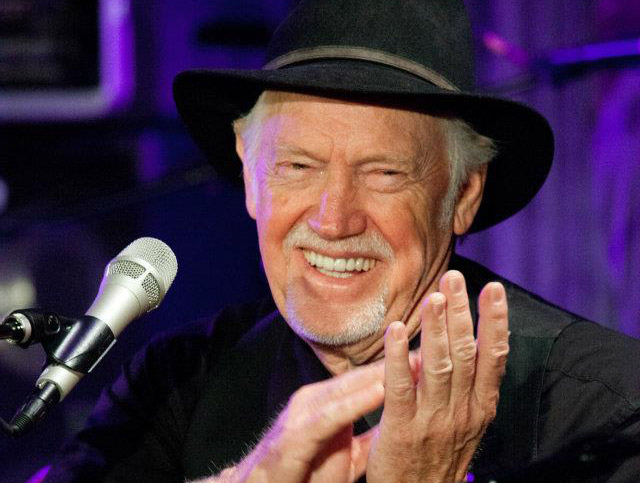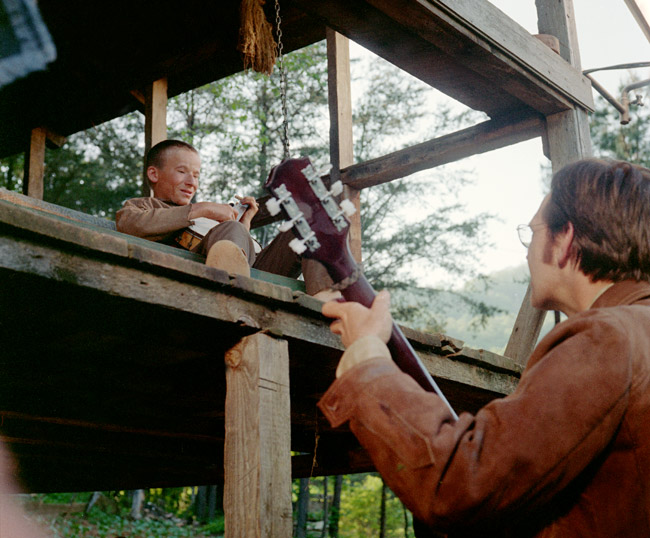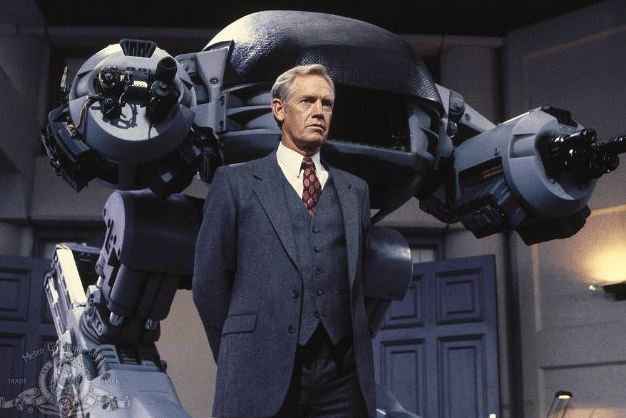Robocop, Total Recall, Taps, Bound for Glory, and Beverly Hills Cop; actor Ronny Cox certainly has compiled an impressive resume. However, back in 1972, Cox was just starting out -- in a little film called Deliverance.
The Oscar winner about a guys' weekend gone wrong had a built-in audience with mega-stars Burt Reynolds and Jon Voight. For Cox and Ned Beatty, however, it was the very beginning of two lengthy film careers. Despite who was who and who was starting out, the four created something unmatched both in front of and behind the camera.
To mark the 40th anniversary of John Boorman's classic thriller, Warner Bros. has released a new Blu-ray Book (see our Deliverance Blu-ray Book Review). Cox is also reminiscing in his own book titled, Dueling Banjos: The Deliverance of Drew, which recounts all of his film experiences as clear as if they happened last week.
Big Picture Big Sound got the chance to ask Cox a few questions. He talked up everything from his iconic first film role and performing (and not) "Dueling Banjos" to the fun of playing a bad guy and how he's not too excited about the upcoming Total Recall and Robocop remakes.

BPBS: In your book, you said that all of the Deliverance actors did their own stunts. Did you ever feel like this is it, I'm definitely going to die?
Ronny Cox: Yes! I almost drowned once, Ned [Beatty] almost drowned once. Jon Voight and I broke five canoes right in half. That film was made in a way that films were never made before and probably never will be made again. We shot it in sequence and we did all of the stuntwork ourselves. [Director] John Boorman had a theory that if a shot is so dangerous that you need stuntmen, you probably shouldn't be doing the shot anyway.
BPBS: Have you gone canoeing since then?
RC: Once. I don't care if I ever see white water again.
BPBS: "Dueling Banjos" is one of the most iconic scenes in film. I know you are an accomplished musician. [Cox has a total of eight albums.] Were you happy that the role allowed you to incorporate your musical side?
RC: Absolutely. The fact that I could play the guitar was instrumental (pun intended) in me getting the job. I didn't play the actual piece on the soundtrack, though. I would have had to miss a day of canoe practice and a day of rehearsal to record the song. None of us thought about it being a hit song. I'm not nearly as good a guitarist as Steve Mandell, who played the guitar on the soundtrack. But you see, John Boorman didn't really care about that. He wasn't worried about making a number one hit song. He kind of liked the idea that this incredible mountain boy on the banjo was showing up this city slicker amateur guitar player. Having said that, they got Eric Weissberg and Steve Mandell to do that and then we matched the playback. And I matched it note for note. Did I play it? Yes. Is that me on the soundtrack? No. And because of that, I probably cost myself about a gazillion dollars.

BPBS: With Deliverance being such a huge success, did you feel a lot of pressure when you took on your next role?
RC: I did, but Deliverance opened doors to those next films that I didn't even know existed before that. Yeah, there is a certain amount of expectation. It was such a big splash for me and Ned, being such complete unknowns. That's one of the reasons that I wanted to write the book [Dueling Banjos: The Deliverance of Drew], because my life so totally changed as a result of that film. I never made more than $6,000 as an actor in my life before that, in one year.
BPBS: Why did you decide to write Dueling Banjos: The Deliverance of Drew now? Is it for the anniversary? The way it's written makes it seem like it all happened last week.
RC: I didn't decide to write it because of the 40th anniversary. I've been telling these stories for years and people have been after me saying, "Ronnie you need to put these down." I just finally had the time to do it. I'm glad that you picked up on the way it was written. The book has no literary pretension. I wanted this book to be like I was sitting around, having a cup of coffee with you and telling you these stories. I wanted it to feel that way.
BPBS: When you're walking down the street, what role do people shout out when they see you?
RC: Even though I've been in a million movies and TV shows over the years, I almost never get recognized as an actor. People just think that they know me. They think I'm somebody's uncle or somebody's cousin. If you think about it, it's the biggest compliment an actor can get because they don't think of you as an actor.
This is a true story: I was in an airport, waiting for my luggage to come down from the carousel. This lady kept looking at me. She finally came over and stood in front of me, put her hands on her hips and she very irately said, "Aren't you even going to speak to me??" I said, "Uh, I'm sorry. Why, hi." And she said, "You've just been my gynecologist for 14 years!"
BPBS: Is it more fun playing a bad guy or a good guy?
RC: Bad guy by 1000 percent! I love playing the bad guy! In some ways, Robocop and Total Recall were as big of a boon to my career as Deliverance. In Deliverance, Drew was the morale good guy. So for about the first 10 years of my career after that, I played nothing but good guys. When I got to play Dick Jones in Robocop, all of a sudden, I got to play these bad guys and then I started getting all kinds of offers. It's like this, we try to be good people every day of our lives. That's boring. The guys that get to make the most interesting choices are always the villains. Just this last year, I got to play a role on Dexter. I was one of the worst serial killers they'd ever seen, the Tooth Fairy. [Laughs maniacally.] What a fun character.

BPBS: How do you feel about the upcoming Total Recall and Robocop remakes?
RC: I'm not real fond of that. I don't like remakes and I don't like sequels. I think those films are pretty darn good already. I don't know why they're remaking them. The only thing that I can think maybe is that people think they can make more money off of them. Personally, I would just like to see them do like Warner Bros. did with this Blu-ray edition of Deliverance, and put a really good Blu-ray edition of those out. I wish they would do that with Total Recall and with Robocop and forget about remaking them.
BPBS: Do you think Deliverance would ever be remade?
RC: For years, Burt had the rights to Deliverance and I think kind of wanted to make a sequel to it. I'm so delighted that they never did that.
BPBS: In Deliverance, your character Drew is sort of found in an odd position post-mortem. Audiences are probably shocked to know that it's all you -- and not a prosthetic. Did you ever do that arm trick at parties?
RC: Oh yeah. I used to make big money being able to do that when I was in college. Both shoulders could come out of place. If you could envision this, I could clasp my hands in front of me, step through them, and bring them all the way over and back around without ever letting go of my hands. It would take about a week to set this trick up because people would start saying, "Ronnie can do this trick." Then there would be a guy that would say that I couldn't do it and I'd bet him a dollar that I could do it. Then I'd say, "No, you've got to get 200 guys and I'll bet each one of you a dollar." Pretty soon, I'd have 200 guys all willing to put up a dollar. Then, I'd do it really fast and they'd want me to do it again. I could've made enough money to go through college.
The 40th anniversary Deliverance Blu-ray Book and Ronny Cox's book, Dueling Banjos: The Deliverance of Drew, are both available now.
Where to Buy: